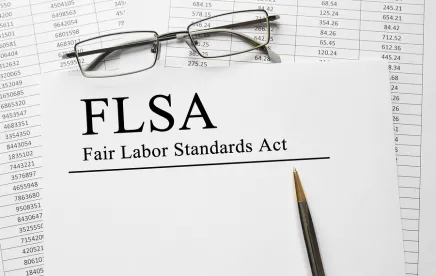On February 1, 2021, in an unpublished opinion resolving a Fair Labor Standards Act (FLSA) attorney’s fees dispute, the Eleventh Circuit Court of Appeals, in Batista v. South Florida Womans Health Associates, Inc., struck another blow against unreasonable plaintiffs’ counsel seeking “reasonable” fees. Mitzy Batista appealed the district court’s finding that it would be unreasonable to award her counsel, Elliot Kozolchyk, any attorney’s fees given his conduct during litigation filed under the FLSA. Ultimately, the Eleventh Circuit remanded the case to the district court to make necessary findings of fact and to issue its ruling regarding whether the employer had mailed a replacement check. However, in doing so, the Eleventh Circuit provided additional analysis as to when reasonable attorneys’ fees in an FLSA case may be no fee at all.
Background
Mitzy Batista was employed for slightly over two weeks in January 2018 by South Florida Woman’s Health Associates, Inc., when she was discharged for missing work. Batista claimed that she never received her last paycheck and was owed $275.50 for the 38 hours she worked. South Florida Woman’s Health Associates claimed that Batista’s last paycheck was mailed to her last known address and that because the check was not returned, and because Batista did not contact the company, South Florida Woman’s Health Associates assumed that all was well. Batista, however, claimed that she called her former employer’s office the day after she was fired and asked for her final paycheck. She alleged that at first she was told she would be paid by direct deposit, only to be told a few days later by the receptionist that the owner of the clinic, Edward D. Eckert, was not going to pay her at all.
Batista met with her counsel, Kozolchyk, three weeks after her employment was terminated. But in the three months that followed, neither Batista nor Kozolchyk contacted her former employer to ask about the missing check. In May 2018, Batista sued her former employer, raising claims under the FLSA including violations of the minimum-wage provision, liquidated damages, and attorneys’ fees and costs. After receiving notice of the lawsuit, Eckert offered to send Batista a check for her unpaid wages but not her attorney’s fees. Kozolchyk ignored Eckert’s initial offer. When the counsel for South Florida Woman’s Health Associates and Eckert himself reached out again, they offered to clear up the matter and offered to pay the unpaid wages and court costs.
Kozolchyk initially ignored their communications and about a month later rejected the settlement offer. Kozolchyk insisted on receiving attorney’s fees in an amount greater than what Eckert believed to be reasonable, stating, “my client cannot agree to shoulder the fees in this case … [for] those are recoverable against the defendants above and beyond the value of the claim.” Kozolchyk then demanded his fees in the amount of $3,200, and Eckert counteroffered $1,100 in attorney’s fees. Ultimately, the parties settled and agreed that Batista was to be paid $551 in unpaid wages, liquidated damages, and costs in the amount of $523, and that “the task of deciding the question of reasonable attorney’s fees” would be left to the district court. The settlement was approved and Batista filed her motion for attorneys’ fees, seeking $10,675 in fees for the 30.5 hours Kozolchyk claimed to have expended litigating the case. The district court referred the motion to a magistrate judge for a report and recommendation.
The magistrate judge, although “acknowledging the general requirement that prevailing plaintiffs in FLSA actions receive some award of attorney’s fees,” recommended that the court deny Batista’s motion and not award her attorney’s fees. “Specifically, the magistrate judge found that (i) Defendants timely issued and mailed Plaintiff her final paycheck to the address she provided, (ii) Kozolchyk made no effort to contact Defendants to inform them that Plaintiff had not received her check before suing, and (iii) had he done so, he would have discovered that Defendants had sent Plaintiff’s paycheck to her address and were willing to issue another.” Accordingly, the magistrate judge deemed Batista’s fee demands to be “excessive relative to the minimal work [i.e., a brief phone call] necessary to resolve the matter and make his client whole.” The district court adopted the factual determinations and legal conclusions contained in the report and recommendation and rejected Batista’s objections, which included an affidavit in which she averred that she had telephoned someone in South Florida Woman’s Health Associates’ payroll department to request her last paycheck. South Florida Woman’s Health Associates did not provide an affidavit to support its own allegations.
The Court’s Analysis
In determining whether the district court abused its discretion when it determined that a reasonable attorney’s fee in the case was no fee, the Eleventh Circuit reviewed guidance provided by analogous case law in the Southern District of Florida—including cases where plaintiffs were also represented by Kozolchyk.
Initially, the court discussed the “seminal district court case” of Goss v. Killian Oaks House of Learning, which was decided in 2003. There, the plaintiff was a former employee who alleged she was owed two days of pay. The former employer had issued a check and told her to pick it up, but instead of doing so, she hired a lawyer who sued the former employer for failure to pay wages. The plaintiff’s lawyer asked for over $16,000 in attorneys’ fees where the matter settled for slightly over $300 for unpaid wages. The Goss court stated that regardless of “the FLSA’s provision for a mandatory award of attorney’s fees for a prevailing plaintiff, ‘an entitlement to attorney’s fees cannot be a carte blanche license for Plaintiffs to outrageously and in bad faith run up attorney fees without any threat of sanction.’” The Goss court “concluded that there are ‘special circumstances’ that can render the award of attorney’s fees unjust and that ‘so-called nuisance settlements represent such a circumstance.’”
The Eleventh Circuit also discussed Nelson v. Kobi Karp Architecture & Interior Design, Inc., a 2018 case in which “the [district] court denied in its entirety a fee request by counsel in [the] case, Mr. Kozolchyk.” The plaintiff in Nelson had sued for two days of unpaid wages equaling $116, and after settlement, Kozolchyk had sought more than $9,000 in attorney’s fees. In Nelson, the employer had immediately tried to resolve the matter after suit was filed by paying the unpaid wages at issue, plus $1,500 in attorney’s fees and costs, which Kozolchyk declined. The employer, through counsel, then physically tendered the money in question and offered $2,000 in fees and costs, but Kozolchyk still declined. The Nelson court ultimately determined that ‘Kozolchyk’s “sole intent [at that point] was to run up his bill.’” Therefore, the Nelson court concluded, awarding any attorney’s fees would be “unreasonable, unjust, and inequitable.”
Similarly, in the 2019 case of Olguin v. Florida’s Ultimate Heavy Hauling, after Kozolchyk had filed suit, “the employer unconditionally tendered to Kozolchyk all the wages requested by the plaintiff, but Kozolchyk refused to accept the tendered paycheck” and lengthy litigation ensued on a separate claim, which he ultimately abandoned. Kozolchyk ultimately sought attorney’s fees of over $36,000. The Olguin court denied the request for attorney’s fees, finding that Kozolchyk’s “conduct was part of a strategy to churn the file and create unnecessary attorney’s fees.”
The Eleventh Circuit, analyzing the prior case law, clarified that the absence of any inquiry by counsel notifying an employer prior to filing an FLSA action was not in and of itself sufficient to deny attorney’s fees. Specifically, the court noted that although it had denied fees in Sahyers v. Prugh, Holliday & Karatinos, P.L., a 2009 case in which the plaintiff’s counsel had filed a lawsuit without contacting the prospective defendants to resolve the matter extrajudicially, the holding was limited to the facts of that case—“an FLSA suit filed against fellow attorneys as defendants.” Indeed, the court emphasized that an attorney is required under the Federal Rules of Civil Procedure “to make reasonable inquiry into the facts underlying a claim.” That is, “litigation in which the defendant-employer has done what it should reasonably do to get payment to a former employee, but in which the employee or her attorney has made no pre-suit effort to inform the employer that the payment was never received creates a scenario fitting into the … ‘nuisance litigation’ category.”
Ultimately, the Eleventh Circuit remanded the case because the primary reason for the district court’s holding that attorney’s fees should not be awarded rested on “the finding that Defendants had actually mailed a final check to Plaintiff prior to her lawsuit.” However, the record lacked evidence to support this finding because “Defendants had never supported their factual position with an affidavit, [so] their assertions were likewise insufficient to create an adequate evidentiary basis for findings that Plaintiff ultimately contested.”
Key Takeaways
The decision provides helpful guidance to employers. In instances in which an employee is seeking unpaid wages where the amount of wages sought is partly or fully contested, the employer may want to consider tendering payment in full pre-suit where such sum is nominal. Providing full tender of the payment may assist in preventing an overinflated award of attorneys’ fees and costs where the employee’s counsel’s primary intent is to “churn the file” and gain fees in bad faith. When considering their options, employers may want to take heed that FLSA cases are fact-specific.





 />i
/>i

